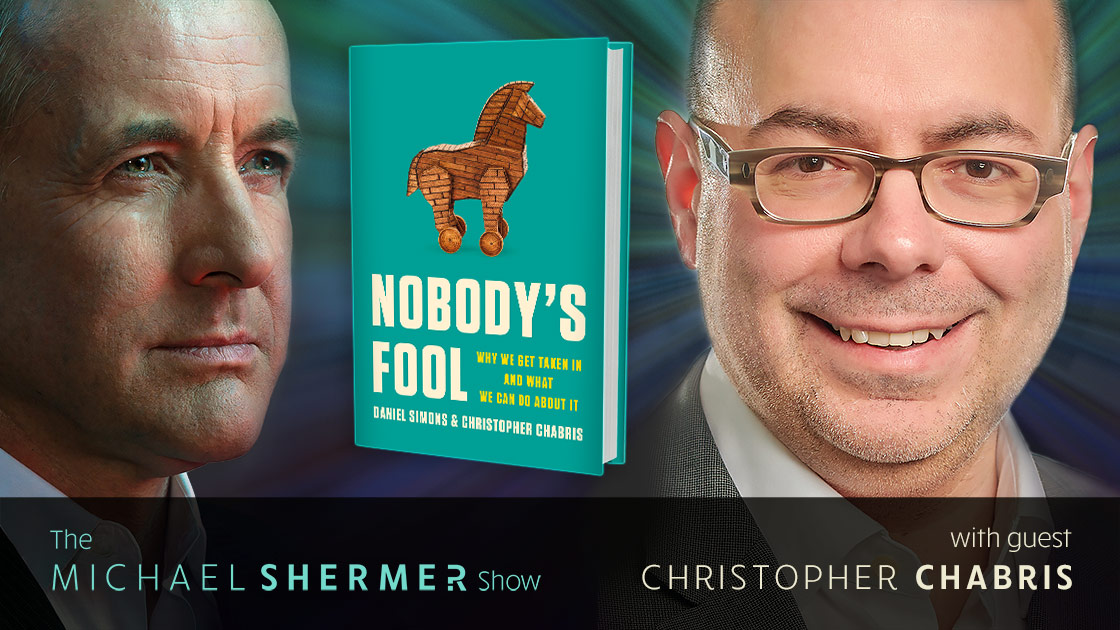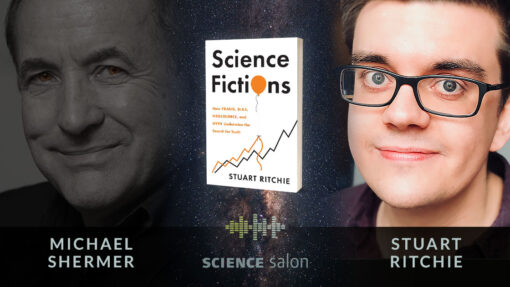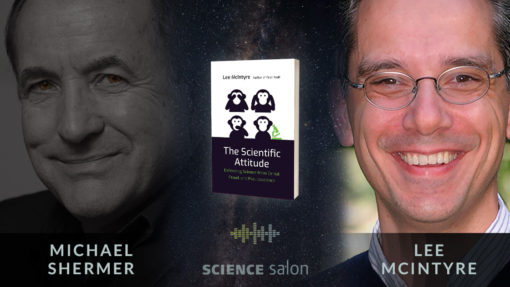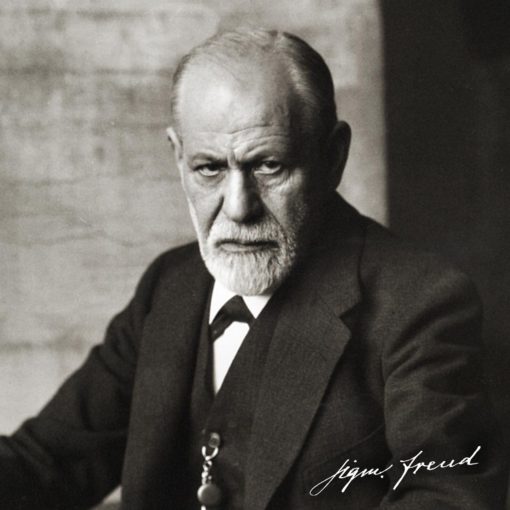fraud

Shermer, Simons, and Chabris discuss: • How rational vs. irrational are humans? (Daniel Kahneman vs. Gerd Gingerenzer) • Truth Default Theory, or Truth Bias • deception vs. deception detection • social proof and the influence of others on our beliefs • cults • Bernie Madoff • Harvey Weinstein • Elizabeth Holmes and Theranos • Nigerian spam scam • cheating in chess • habits of thought that can be exploited • information hooks we find especially enticing instead of triggering skepticism…
We are fascinated and enraged by pathological liars like George Santos, who lie with every breath. But everybody lies, out of courtesy, self-protection, or self-advancement. Toddlers start lying as soon as they start speaking, suggesting that deception evolved right along with language as an adaptive strategy. The social danger is not that people lie, but the obliteration of the line between a lie and its consequences. Once, anyone lying as blatantly as Santos would have been shamed or laughed out…

Shermer and Pope discuss: SBF and FTX • Bernie Madoff • The Tinder Swindler • gullibility • intentional perps, accidental perps, and righteous perps • innocent bystanders and organizational targets • accidental whistleblowers, noble whistleblowers, and vigilante whistleblowers • identity theft • IRS scams • doping in sports • Frank Abagnale Jr. • Edward Snowden and Julian Assange as righteous perps • Daniel Ellsberg as a noble whistleblower • Phil Zimbardo and The Lucifer Effect • how to tell if…

Over the last six years, allegations of stolen elections and massive election fraud have proliferated in the United States. The significance of claims that the results of one election—let alone several—were fraudulent, cannot be overstated. When citizens believe an election has been stolen, chaos, riots, and the potential collapse of political systems ensue. That means the question of whether an election was stolen or rigged should demand the highest level of scrutiny and the highest degree of skepticism. In this…

In this conversation, Shermer speaks with Adam Levin, a consumer advocate with more than 30 years’ experience in personal finance, privacy, real estate and government service. A former director of the New Jersey Division of Consumer Affairs, Levin is Chairman and founder of Identity Theft 911.
Join us for an expedition Along the Ancient Coast of Turkey (October 8–17, 2022) aboard the privately-chartered 34-Guest Callisto. PLUS, Michael Shermer speaks with Adam Levin on Identity Theft and How to Protect Yourself from Scammers, Phishers, and Fraudsters of All Types.

In episode 195, Michael speaks with internationally acclaimed sleight-of-hand artist and 35-year activist for scientific skepticism, Jamy Ian Swiss, about his lively, personal book, The Conjuror’s Conundrum, that takes readers on a magical mystery tour of the longstanding connection between magic and skepticism.
In episode 195, Michael speaks with internationally acclaimed sleight-of-hand artist and 35-year activist for scientific skepticism, Jamy Ian Swiss, about his lively, personal book, The Conjuror’s Conundrum, that takes readers on a magical mystery tour of the longstanding connection between magic and skepticism.

Science is how we understand the world. Yet failures in peer review and mistakes in statistics have rendered a shocking number of scientific studies useless — or, worse, badly misleading. Such errors have distorted our knowledge in fields as wide-ranging as medicine, physics, nutrition, education, genetics, economics, and the search for extraterrestrial life.
Dr. Michael Shermer considers the pitfalls of projecting the consequences of the pandemic for our future (the availability heuristic, the negativity bias, the difficulties of superforecasting, and the contingent nature of history). PLUS: In Science Salon # 131, Michael Shermer speaks with Stuart Ritchie his book Science Fictions: How Fraud, Bias, Negligence, and Hype Undermine the Search for Truth.
John Anthony Glynn claimed to have a Ph.D. in psychology and professorships of psychology at several universities. He committed academic fraud by representing himself as a Ph.D. psychologist to several academic institutions and under those credentials committed journalistic fraud by publishing over 40 articles in 15 different outlets in 2019 alone. The extent of this calculated, systematic, and repeated deception warrants publishing our findings, the details of which follow.
John Anthony Glynn claimed to have a Ph.D. in psychology and professorships of psychology at several universities. He committed academic fraud by representing himself as a Ph.D. psychologist to several academic institutions and under those credentials committed journalistic fraud by publishing over 40 articles in 15 different outlets in 2019 alone. The extent of this calculated, systematic, and repeated deception warrants publishing our findings, the details of which follow.

In Science Salon # 77, an engaging conversation on the nature of science, Dr. McIntyre and Dr. Shermer get deep into the weeds of where to draw the line between science and pseudoscience.
In Science Salon # 77, an engaging conversation on the nature of science, Dr. McIntyre and Dr. Shermer get deep into the weeds of where to draw the line between science and pseudoscience. PLUS Dr. John Glynn reflects on our ever-increasing sensitivity to the perception of harm in an article about concept creep.

In this week’s eSkeptic, Margret Schaefer reviews Freud: The Making of an Illusion, in which its author, Frederick Crews, convincingly argues that Freud constructed psychoanalysis on a fraudulent foundation. How did Freud convince so many people of the correctness and the profundity of his theory?

Margret Schaefer reviews Freud: The Making of an Illusion, in which its author, Frederick Crews, convincingly argues that Freud constructed psychoanalysis on a fraudulent foundation. How did Freud convince so many people of the correctness and the profundity of his theory?

Michelle E. Ainsworth reviews the book: The Witch of Lime Street: Séance, Seduction, and Houdini in the Spirit World, by David Jaher.
The latest issue of Skeptic magazine (21.1), CONFIDENCE SCAMS, features an excerpt from Maria Konnikova’s The Confidence Game: Why We Fall for It … Every Time, “A gripping examination of exactly why so many of us are such suckers for schemes that shut down our saner instincts.” (Vice). PLUS: Did Highly Developed Europeans Build a Sophisticated Astronomical and Religious Monument on the American East Coast More than 3000 Years Ago?; Is Star KIC 8462852 a Sign of an Extraterrestrial Civilization?;…
In this week’s eSkeptic, we present Pat Linse’s debunking of the alleged fraud on Obama’s long form birth certificate.

Michael Shermer exposes James Van Praagh and discusses some of the techniques ‘psychics’ use to ‘talk’ to the dead.
NEXT →


















